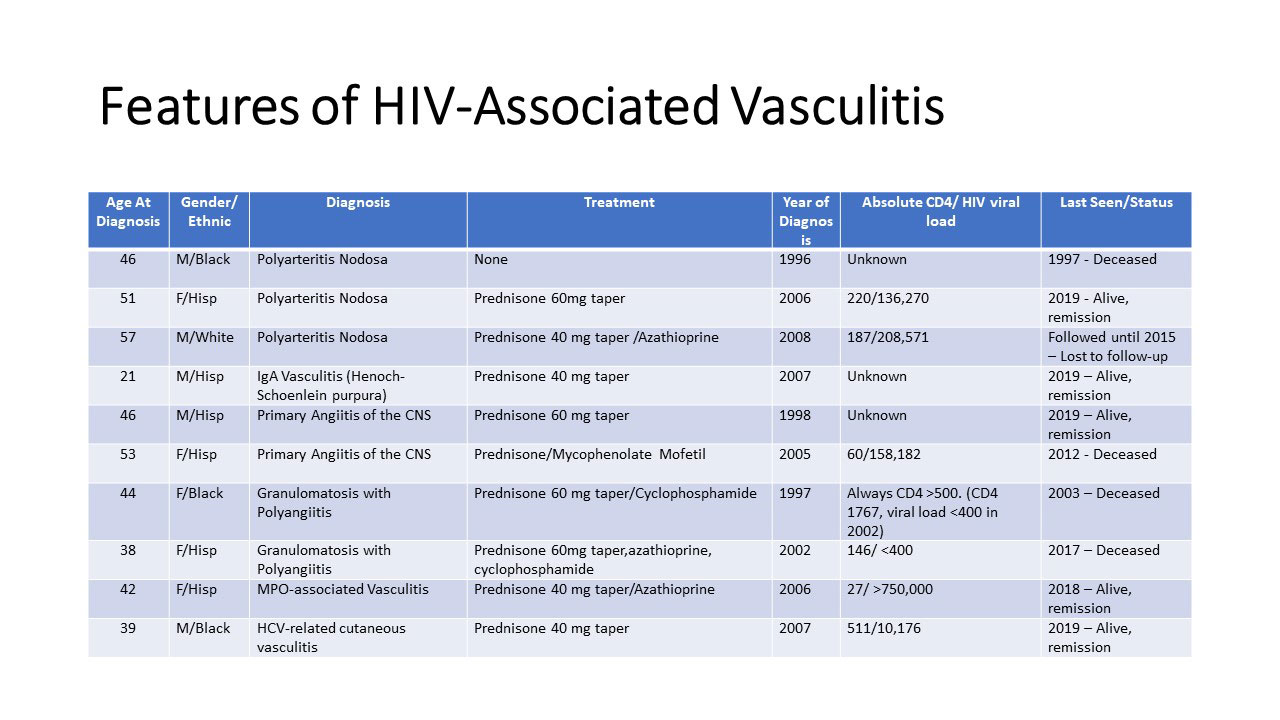Session Information
Session Type: Poster Session (Tuesday)
Session Time: 9:00AM-11:00AM
Background/Purpose: A large spectrum of vasculitides affecting small, medium, and large vessels have been reported in HIV-infected individuals. Although vasculitis is a rare manifestation of HIV, it is a clinically important complication to recognize that requires immunosuppressive treatment. The purpose of this study was to examine the clinical features and treatment outcomes of HIV-infected individuals with vasculitis referred to a rheumatic disease clinic specialized in the treatment of HIV-related disorders.
Methods: A retrospective chart review of HIV-infected patients evaluated at an outpatient rheumatology clinic from 1994-2019 was performed. Pertinent demographic data, disease features, laboratory data, treatment, and adverse events were collected.
Results: Ten of 1127 HIV-infected patients were diagnosed with the following: systemic vasculitis/polyarteritis nodosa (n=3), granulomatosis with polyangiitis (n=2) primary angiitis of the CNS (n=2), MPO-associated vasculitis (n=1), IgA vasculitis (n=1), HCV-associated cutaneous vasculitis (n=1). Ten patients were treated with prednisone, and 5 patients required additional immunosuppression with azathioprine (n=3), cyclophosphamide (n=2) and mycophenolate mofetil (n=1). Nine patients had sustained remission for several years. Five patients are currently alive, 3 patients died of non-vasculitis related complications, and 1 vasculitis-related death occurred in a patient who did not undergo treatment. One patient is lost to follow up. Of particular interest, no new cases of vasculitis were referred or diagnosed after 2008, despite no changes on the clinic physicians and no alternative clinical referral sites having become available.
Conclusion: Patients treated for vasculitis in the setting of HIV do well with sustained remission suggesting this is a milder form of disease. Additionally, the absence of new cases over the past 10 years is likely result of more effective antiretroviral treatment. This supports the hypothesis that the development of vasculitis in HIV-infected individual is an antigen or viral (i.e. HIV) driven process
To cite this abstract in AMA style:
McCray C, Salazar G, Valicek R, Nguyen B, Naovarat B, Williams F, Reveille J. Vasculitis in HIV-Infected Individuals: Making the Case for an Antigen Driven Process [abstract]. Arthritis Rheumatol. 2019; 71 (suppl 10). https://acrabstracts.org/abstract/vasculitis-in-hiv-infected-individuals-making-the-case-for-an-antigen-driven-process/. Accessed .« Back to 2019 ACR/ARP Annual Meeting
ACR Meeting Abstracts - https://acrabstracts.org/abstract/vasculitis-in-hiv-infected-individuals-making-the-case-for-an-antigen-driven-process/

